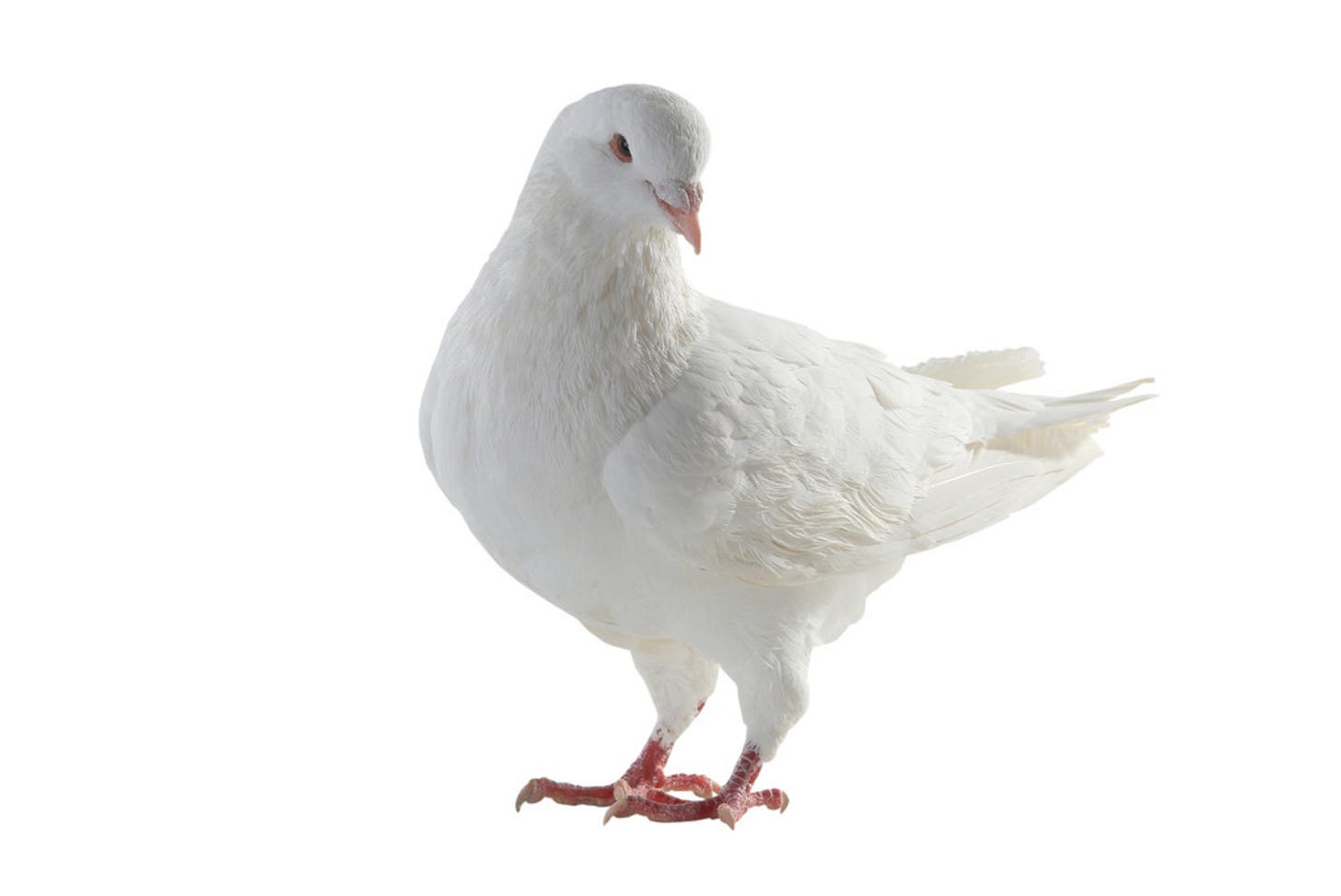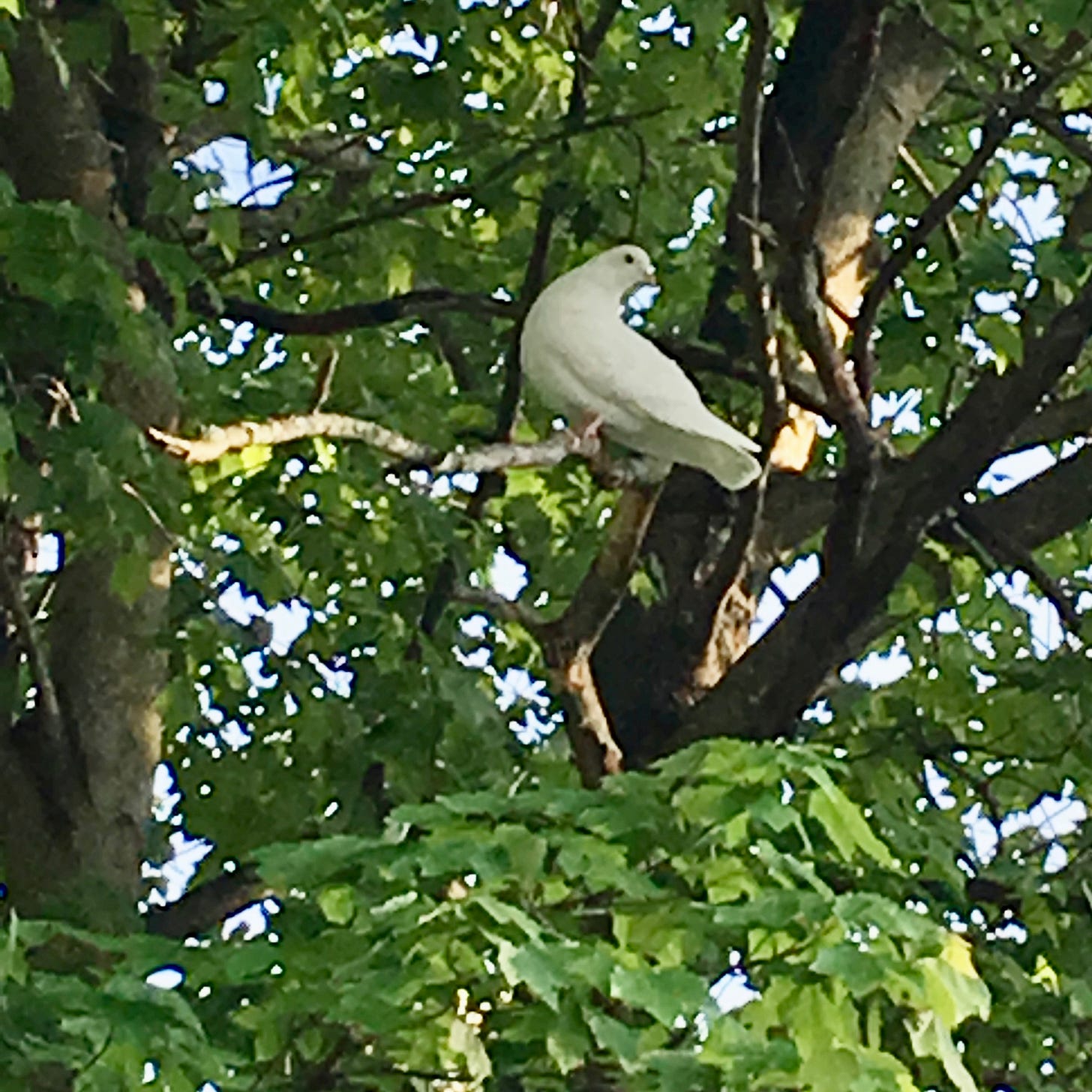First, there were a dozen, maybe more. Not so many that they couldn’t be easily counted. But I never did. In fact, I never did much of anything with them other than marvel at their relative freedom. I loved how they propelled themselves out of the coop and into the air, without restraint, their wing sonations—the snap and sing of each takeoff—a welcome refrain in the daily soundtrack of the farm.
It surprises me, now, that I was so utterly uninvested in their care, but it wasn’t a role assigned to me. The chickens—all 125 of them, minus the inevitable losses—those were my charges, and I learned everything I could about keeping them: Where to buy them, what to feed them, how to provide a safe environment, how to catch them if they escaped, which breeds were hardiest, which were broodiest, which the best layers, which the most neurotic, how to dispatch them when their egg laying became too sporadic, and how to do it as humanely as possible.
The pigeons were outside my wheelhouse, and I’m not altogether sure what happened, but they dwindled. Death by disease. Death by predator. A general inability to thrive. Whatever it was, one day only one remained.
We called him Pidge.
I wish I remembered how long he lived with us on his own, but he was so much a part of the texture of the place that it didn’t occur to me to keep track. Like black crickets in late summer, and black walnuts in fall, he was just always there.
In the absence of a flock-based routine, Pidge took to roosting where he pleased. He seemed to prefer the rafters of the open pole shed at night and the barn roof in daylight, but he could turn up just about anywhere. His welcoming coo announced his location even when I couldn’t find him with my eyes.
Pidge, a King pigeon breed, was sturdy, much bigger than a city bird. Except for his blush beak, obsidian eyes and beet-red legs, he was completely white. He appeared an easy target for an owl or hawk, but somehow he outwitted his would-be predators season after season.
One spring evening, my partner arrived home with a friend. Having recently completed a massive clear out and clean up from a throng of feral pigeons residing in the upper floor of the old mill where he worked, a lingering bird, a surprisingly friendly stay-behind, sparked an idea. Why not a partner for Pidge?
The newcomer, in colors more typical of those seen on city streets, was considerably smaller than our King, and truth be told, we had no idea if it was male or female. It didn’t take long to find out. Pidge’s excitement was uncontainable. He danced and twirled, rumbled and cooed, puffed and bobbed and bowed. In no time, the pair was building a nest in a wedge of safety between two adjoining sheds. We were so proud for Pidge, so happy for his happiness.
When the hawk plunged from the heavens, we were there to witness it. In the time it took to process what was happening, an explosion of soft gray feathers appeared on the lawn, a limp form at its center. The hawk lifted off, gripping its victim with strong talons, and just like that, Pidge’s mate was gone. We were powerless to do anything about it.
Oh, how we mourned! Pidge with his incessant, keening coos and we with our shattered joy, grieved our wasted hope. My oh-so-human guilt festered like an abscess. Could we not have done more? Had we learned nothing about the care and keeping of those relying on us for support?
We recovered, eventually, like we do—we, the humans, and Pidge. Somehow, we fumbled our way into the grace-giving transmutation that allows rawness to recede and rhythm to return. Another caregiver might have looked for a family to take Pidge, found a resource for a new keeper with a dovecote and a flourishing flock. Instead, we clung to what we had.
I’m not sure I knew right away that he had disappeared. It may have taken longer than 24 hours for me to fully acknowledge that he was missing. But once I realized I hadn’t just overlooked him for a day, finding him, or remnants of him, became an obsession. I looked everywhere. I imagined bursts of white overhead, caught the rolling murmur of his calls on the wind. They were nothing more than the manifestations of a hurting heart. He was gone. Though there was no evidence of another hawk attack, we assumed Pidge had finally met his match.
Farm life requires a certain kind of courage. It’s a rare week when something isn’t dead, or dying. Even when you accept the natural cycle of arrivals and departures, of keeping and letting go, the same attributes that make you an attentive steward mean you suffer anew each time you are called to face the truth again.
On a bustling May morning, the day before the seasonal reopening of the farmers market, I paused, doubted myself, and went back to what I’d been doing a moment before. Then, I heard it again: the distinct, throaty coo of a pigeon. Looking up toward the sound, past the fringed tops of the eastern red cedars, face pointed toward the sky, I saw the white shape in stark contrast to the broad, black-shingled roof of the barn. Pidge had returned!
I’ll never know for sure where he spent the many weeks he was away. Given the limits of my perception, it’s likely I wouldn’t understand even if some liminal magic granted us a few moments to speak the same language. Perhaps he met someone who detained him, insisted he stay, someone who watched, in dismay, when he decided to leave after all. Perhaps he found companionship, fathered a new generation and, in his delight, found it in himself to forgive a hawk. Perhaps he needed to separate himself from the source of so much loss before he could, once again, feel called back home.
Some years later, Pidge disappeared again without a trace, this time for good. Later still, after we bid farewell to the farm and its company of incredible inhabitants, my husband met Mr. Palmer, a pigeon keeper who lived in the next village, less than three miles by car from where we’d once lived, fewer as a bird flies. I met Mr. Palmer on a different day, in my new front yard, when he stepped out of his truck and called to the King pigeon I’d just seen landing in a neighboring tree.
”Sometimes, they’re slow to get home,” Mr. Palmer said as the big, white bird took up a spot on the tall man’s shoulder. The two of them returned to the truck together and drove away.
The only thing I truly know about the beings whose lives intersect mine is that I am given but a few precious days to be with them, at least in this iteration of myself. Even as I live, I am leaving, and there’s nothing I can do to change that. Holding out for certainty is a fool’s game, but I can commit to taking care while I’m here. I can depend on laughter, believe in partnership, prioritize beauty. I can, in fact, count on them.
~Elizabeth
A reader and friend recently observed and complimented the community of Chicken Scratch, noting how the comments further expand on ideas offered in the writing, adding richness and a sense of belonging. He’s right. Your interactions here mean so much. I always look forward to reading what has surfaced for you. There’s a lot in this one: the care and keeping of others, loving and leaving, a metaphor for what we might take for granted. Let’s chat in the comments.
Many of you are new here. Welcome! Today’s essay hints at why I chose the name Chicken Scratch. There’s more to it than a big flock of birds (of course there is), but I’ll let that unfold on its own.
I’ve made a choice to keep this publication free for everyone, regardless of means. It is a small kindness I can offer in a world that sometimes seems to have trouble with generosity. Still, as with any creative endeavor, every post requires my time and resources. If you’re able, making a paid contribution to support my work will lift up more than just the words on these pages.
Paid subscription options can be accessed here, and one-time contributions can be made here. Any amount is worthwhile. I’m grateful you’re here.






“The rolling murmur of his calls on the wind.” What a beautiful piece.
Elizabeth, this is such a beautiful story! I'd read it soon after you'd published it but I think I must have been reading it on e-mail on my phone rather than on my computer, because I've just noticed I hadn't hit 'like' or commented!
Establishing a relationship with a wild animal touches parts of us which would otherwise remain untouched. Very special indeed.